Bring us our Ukraine!
We are convinced that, thanks to the daily television and radio broadcasts of the first session of the Supreme Council of the Ukrainian SSR of the twelfth convocation, you already know all these women. And not only because of their participation in the work of parliament, but also because there are so few of them among the 450 deputies of Ukraine — only thirteen.
But what does “few” mean?
Few — of course — when compared to the number of women in previous compositions of the Supreme Council. Yet let us remember that those thirty-odd percent, no more and no less, who were supposed to represent the women of the republic in parliament and attest to the “equality and full rights” of the fairer half of society, could by no means be considered democratically elected by today’s standards. Their candidacies were predetermined and unquestioningly approved from above, and we, the voters, unanimously gave them our votes — only to never hear their real speeches, unedited by an invisible choirmaster.
Of course, these were dubious workers. And it was not their fault, but rather the misfortune that it was they — women, at least the vast majority of them — who were assigned the role of that percentage by which it was possible to pretend that workers and peasants were in power and, if necessary, to create the appearance of some kind of movement, the so-called change in the Supreme Council. This was not for ministers, various deputies and assistants, party secretaries, or heads of executive committees of all ranks to do — their place in the parliamentary Olympus was automatically secured with the presentation of the appropriate portfolio and held until their death in office. Praise be to perestroika — those times, not without difficulties and resistance, are hopefully passing.
And yet there are few women in the current Ukrainian parliament, given that they make up more than half of the republic’s workforce and more than half of its population. But let us not exaggerate the significance of this arithmetic, because it does not determine the outcome in politics. Our current female parliamentarians are true fighters who have earned their place in the highest body of state and legislative power of the republic in a difficult, uncompromising struggle in multi-mandate constituencies. In this struggle, neither their male rivals nor the voters paid any attention to their “weak” gender or pretty eyes. Combat tactics were used, kitchen pots were searched, and every word and every action of the candidates was weighed on the scales of democracy and transparency.
They are all very different in terms of professional, life, and social experience, as well as political orientation. All of them, as never before, are distinguished by their high level of education and professional skills. None are indifferent. Some still retain a fiery rally spirit, but all of them want to WORK in parliament, investing their competence, conscience, and passion in this new job.
We want to give them a voice. But first, let us remind you that our readers have already had the opportunity to get to know several of these female MPs from previous publications — and not just this year. So we, the magazine’s staff, are pleased that we have not been mistaken in our choice of heroines.
When arranging this conversation with our guests, we noted that it would be an open forum, meaning that each speaker could speak on any topic of their choice without prompting from the “chair” — that is, about what hurts, worries, or excites them most. We consider this publication to be a kind of representation of the female members of the Ukrainian parliament to the female population of the republic.
So, the floor is yours…
Deputy Kateryna Pavlivna ZAVADSKA — Zborivskyi 359th electoral district, Ternopil oblast, history teacher at Kozivska Secondary School No. 1, non-partisan, mother of two children.
Yes, I have two children — seven-year-old Marichka and six-year-old Volodia. While I am here at the session, my husband is at home, fulfilling the duties of both mother and father. It is thanks to his blessing that I am in this hall today. He endured alongside me the entire onslaught of the election campaign, with all its work — and all its outright lies. For example, someone went so far as to spread the rumor that a maid did all my housework. “Yes, she has a maid,” the neighbors whispered gleefully, “with a mustache.”
I entered the election knowing the fight would not be easy. Since my candidacy was put forward by the Ukrainian Language Society, I had dozens of meetings with people. Rejecting every temptation, I made no promises of roads or gas. Not because I am naïve or, as some might think, live in special conditions, walking on polished parquet floors and imagining that everyone else lives the same way.
No — I know full well how much we need roads and gas. And I believe Ukraine should have had them long ago. When we count all the resources still exploited by the allied ministries and departments — even the land the gas pipeline runs through — we realize that this is our land, our gas. So, I am not against practical help for my people; I will do what I can. I simply believe this should be achieved through legislation.
For as long as I live, I will never forget how the voters in one of the most remote villages admonished me. To understand the force of their words, imagine a very old village — unreachable by car because the road was nothing but craters — where I was met by elderly, gray-haired women who could not always afford even bread from the store. They gathered around me and said: We don’t want to hear your program. Just tell us — will you bring us our Ukraine?
How can such a longing, such a potential, be ignored in the work of parliament? After all, the people do not want handouts — they want what they have earned.
I will be working in the Committee on Women’s Affairs, Family Protection, Motherhood, and Childhood.
Deputy Kateryna Volodymyrivna BOYKO, Prydniprovskyi 416th electoral district, Cherkasy, General Director of the Cherkasy Production Sewing Association, member of the Communist Party of Ukraine, has a daughter and a son.
I have worked in light industry for over thirty years, and have always been surrounded by women. Over this time, I have heard countless confessions — both joyful and bitter. When I was an ordinary seamstress, my friends often spoke to me about their heartbreaks. Now they talk mostly about what destroys their love for and interest in life itself: the daily double burden of work and home, the constant struggle to secure even basic necessities, the long and tense queues.
Perhaps my voters considered that I would defend women’s interests, which are so close and understandable to me, above all else. And perhaps they believed in my abilities and in the changes our enterprise has undergone over the past five years. They say a technical revolution has taken place among the seamstresses of Cherkasy. Indeed, with the help of the Swiss company Interplastica, we have completely re-equipped our main enterprise, and we believe that in terms of technical level it is among the best in Europe. However, our association includes four more factories that cannot yet boast of good production conditions. As a result, the women working there are overly tired. Of course, we remember them and will take care of them — just as we do of everyone who buys our products.
Because, believe me, it is embarrassing to look people in the eye and constantly explain why factories are operating and supposedly meeting quotas, yet people cannot buy nice clothes. The problem facing Ukraine’s garment workers is that for many years no one paid proper attention to developing our industry. We depend on suppliers from almost every corner of the country. It is time to establish real economic ties with them and to conclude direct contracts with related industries, but under the dictates of the center and the absence of real market relations, this is still very difficult to do.
I will work on the commission on women’s labor and social issues, but I will also constantly advocate for the development of our industry. Above all, I will actively participate in drafting laws that promote the economic independence of the republic as a whole and of each enterprise in particular.
Deputy Svetlana Viktorovna OSTROUSHCHENKO, Primorskyi 298th electoral district, Odessa, deputy editor of the oblast trade union newspaper Glasnost, member of the CPSU.
Naturally, I would like to work on the commission for public information, to which I hope I have contributed through my professional efforts. However, women’s issues have taken precedence.
When I was nominated as a candidate for the People’s Deputy, I agreed to run without making any far-reaching plans or even expecting to win. I simply decided that, in any case, it would be useful for me as a journalist to see the electoral process from the inside.
Ironically, I was assigned to the district with the largest number of candidates for a single parliamentary seat—eleven. I was genuinely surprised when I made it to the second round. As it turned out, it is easier to beat a party apparatchik in an election than a leader of a popular informal organization, which my opponent was. My victory brought me moral satisfaction, for I believe that my twenty-five years of work as a journalist also “voted” for me.
At meetings with voters, I was often asked: “Don’t you think that women and politics are incompatible?” No, I do not. I have traveled abroad and met with various foreign delegations in Odesa—political, public, and religious figures from different countries. As a rule, there are many women among them. Why? I think it is because in countries where living standards are higher and life is easier, women have more time for spiritual development and more opportunities to engage in political and social activities—bringing with them their inherent humanity and compassion. Now, as peacemaking principles become paramount in world politics, women are increasingly recognized as leaders of social movements, political parties, and even entire countries.
Therefore, the extremely modest representation of women in our highest government bodies reflects both the economic and social conditions of our society and women’s humiliating dependence on difficult life circumstances. Women suffer from this, but I am convinced that society suffers even more.
I believe that the process of perestroika will inevitably lead to the social emancipation of women. And you will see how many of them will enter politics, social movements, and organizations—and how much more humane our politics and our lives will become as a result.
Deputy KUZEMKO Maria Vasylivna, Ternopil 363rd electoral district, writer, non-partisan, has a daughter.
Perhaps I should start by saying that when your people are humiliated and despised, it hurts. It was this pain that drove me to the people, away from my desk and household duties. I became the founder of the first oblast council of the People’s Movement of Ukraine for Perestroika in the republic, in Ternopil. It was a time of persecution and intense administrative pressure. We were fined, humiliated, and harassed by the prosecutor’s office and the police, yet we stood our ground. Later, an oblast organization called Memorial was created, and I became its head. The very name of the organization speaks to the depth of human pain and tragedy that has been poured out here. The historical truth, hidden from everyone for decades, entered my soul in vivid images and kept me awake, preventing me from thinking about anything else — all to ensure that the horror, the totalitarian destruction of the people, their thoughts, and their intellect, would never be repeated. All this compelled me to take the path of electoral struggle.
My competitors had strong programs, and two of them also represented the democratic bloc. I am grateful that people believed in me and entrusted me with their destinies. I will, of course, fight and defend each individual and the entire nation as a whole so that we can escape the terrible situation we are in.
My committee work focuses on culture and spiritual revival.
This year, I was accepted into the Writers’ Union. My book To Live and to Love was published by Soviet Writer. I am currently working on a novel called Unity with the World. For now, however, other matters demand my attention. Still, I believe that everything I have lived through will eventually be reflected in my future works.
Deputy SKORYK Larysa Pavlivna, Artemivsk 1st electoral district, Kyiv, associate professor at the Kyiv State Art Institute, candidate of architecture, non-partisan, has a daughter.
Why did I fight so hard for a seat in parliament? If the editors of a women’s magazine expect me to say it was to solve women’s problems, I must disappoint them — no. Although I believe these problems are very important and we will certainly address them, the main task is to solve the problems of society as a whole — the problems of Ukraine.
To some, this may sound abstract. They say it is easier and more useful to think specifically about individuals. But when I speak about Ukraine as a whole, I am thinking about the generations that will come after us. Perhaps they will be better and kinder than we are, perhaps healthier, if we can ensure that this land no longer produces poisoned food and that poisoned water. In any case, I believe these generations are worth our laying down our lives now, if only to prove something to those who resist any change. Otherwise, there is no point in thinking about the future.
Ukraine is the alpha and omega of my life in this world, though there is an even smaller alpha and omega for me — my profession. Why do I say this? Not because I am obsessed with Ukraine or blind to the rest of the world. On the contrary: I want to see the world in all its colors, including blue and yellow, and I dream of Ukraine as an equal among equals.
That is why I entered this parliament, why I fought so hard, why I wanted it so much. And you can be sure that no issue to be decided here leaves me indifferent.
Since my profession is my alpha and omega, I naturally sought to work in the committee I insisted on creating — the Committee on Urban Planning, Architecture, and Historical Preservation. These issues encompass the full spectrum of our tasks, as they unite politics and economics, material and spiritual culture. I would also gladly work in other committees, especially the one on state sovereignty. I believe we also need a commission to exercise parliamentary oversight over the activities of the army, the KGB, and the Ministry of Internal Affairs. So far, we have not succeeded in creating it, and although I would like to work there, under the rules one cannot serve on more than one standing commission with voting rights. Therefore, I chose the one in which I must be most competent. It is part of the Committee on Culture and Spiritual Revival.
Deputy KALYNETS Iryna Onufriyivna, Mykolaiv 274th electoral district, Lviv oblast, head of the Department of Public Education of the Lviv Oblast Executive Committee, non-partisan.
I am a philologist by education, and I have a daughter, a son-in-law, and a granddaughter, Hanna. I am grateful for the opportunity to raise my granddaughter, and, God willing, misfortune will not part us as the Brezhnev-era political camps once separated me from my daughter Zvenislava.
It is no coincidence, I believe, that the word motherland is feminine. Both the family and the nation begin with the mother. I envision Ukraine’s future in its freedom, in high Christian morality, and in enlightened churches—because this morality, tested over thousands of years, has proven its spiritual indestructibility and has already answered the question: Why do we exist?
We are seeds sown in the greenery of the planet so that, once we leave our bodies, we may blossom into the extraordinary beauty of spiritual immortality. We are the flame of a candle, where the wax is the body, the fire is life, and the light is the immortality of the soul.
To burn rather than smolder, to remain in the light and not sink into darkness, to grow with the shoots of love—this is what a mother must teach her children.
A sick society… It is no coincidence that our conversation today has turned to questions about our misfortunes. Yet I believe that the issue of gifted children is no less urgent. They are the future of the nation—its elite, its talents. That is why I suggest we continue this conversation in the pages of the magazine’s next issues. For my part, I will not overlook these problems in my work on the Committee on Public Education and Science.
Deputy YAKHEEVA Tetiana Mykhailivna, Desnianskyi 438th electoral district, Chernihiv, associate professor at the Chernihiv branch of the Kyiv Polytechnic Institute, Candidate of Economic Sciences, non-partisan, mother of a six-year-old son.
I entered the Supreme Council with certain ideas, although I do not have high hopes for the work of the parliament in its current composition. As a political economist, I understand that people’s actions are determined by their economic and social interests, and many of our deputies are too dependent on their position within the social system. Therefore, I believe we can expect only half-measures — perhaps the identification and elaboration of certain issues and alternative proposals — but, unfortunately, not the resolution of the fundamental problems facing Ukraine.
Solving these problems would be far easier if the republic were economically independent and sovereign. Yet we currently assign very different meanings to this concept: for some, it means Ukraine’s separation from the Union; for others, new forms of federalism, and so on.
In my view, we must create a republic that is politically, economically, and socially self-governing — independent not from Russia, Belarus, or, say, Moldova, but from the monopolistic structure of the center. I am convinced that, in the long term, we will achieve such a union. I do not know what it will be called — a confederation, a federation, or simply a union — but the name is not important. I see it as a community organized along the lines of a common market. To reach this level, however, we must first separate ourselves to a certain extent and determine which functions to delegate to the common center. The key is to move forward calmly, without haste or extremes, guided by the interests of the people and by common sense. This will not be easy, but I support balanced positions and believe that all of us in parliament must make the most of the opportunity we have been given to contribute to real change. If we fail to do this now, there will be no reason for us to remain in parliament.
As you might guess, “my” committee will be the one responsible for issues of economic reform and the management of the national economy.
Deputy Halyna Hryhorivna ARKHIPOVA, Slavuta 406th electoral district, Khmelnytskyi oblast, chair of the Slavuta Council of People’s Deputies, first secretary of the Slavuta City Committee of the Communist Party of Ukraine, historian by profession, member of the Communist Party of the Soviet Union, has a daughter.
I hesitated for a long time before agreeing to run for election — and here’s why. I have many responsibilities, my work is difficult, and the situation in both society and the party is far from easy. But it was precisely this understanding that pushed me forward, because I believe that only by grasping the situation in depth can we achieve change.
At present, many issues are extremely difficult to resolve. Moreover, to be frank, we still do not sense any real urgency on the part of the republic’s government in defending its own interests. Let me give you an example. Over the past four years, our district has sold more than 4,000 tons of meat to the state, exceeding the quota. Yet in 1989, we received 17 tons less in state supplies for the needs of the district than we had in 1988. How can this be explained to people? I raised this issue at the oblast party conference, and before the Chairman of the Council of Ministers of the Union and the republic’s government, but the response was silence. So, deciding to take matters into our own hands, we showed at least some independence: all the meat that exceeded the quota in our district we sold directly to support our people. How could we not, when each resident of Slavuta receives only 4 kilograms of meat per year? This is why I came to parliament — to advocate for Ukraine’s earliest possible sovereignty, so we can move faster in implementing economic reform and resolving the food programme.
I have expressed my wish to work in what I consider to be one of the most humane committees in parliament — the women’s committee — especially since it deals with all the key problems facing society.
Deputy YESHCHENKO Valentyna Mykolayivna, Vyshhorod 217th electoral district, Kyiv oblast, chief physician of the Novopetrivska district hospital, physician-therapist, non-partisan, mother of two children.
I have worked in the healthcare system for a quarter of a century, and for the past three years I have led a small team of about 150 people. It was these colleagues who, believing that change is now possible not only in words but also in deeds, nominated me as a candidate for People’s Deputy.
It so happened that, in the very first days of the session, when the issue of mass health improvement for children living in areas affected by the Chernobyl nuclear accident arose, I was elected to the Temporary Deputy Commission for monitoring the resolution of these Issues.
During the commission’s work, I came to understand better the bureaucratic mechanisms that can block even those decisions adopted by the session itself. Here is one example. All the sanatoriums in our republic have a combined total of 717,504 places, so it might seem that children from the Chernobyl zone could be accommodated for rehabilitation without much difficulty. But no — most of these sanatoriums are for adults. So, I asked: couldn’t grown-ups give up their places for the children, at least temporarily? And I was told that the beds were too long, the tables too high, the chairs too wide, and the diet unsuitable. I felt such frustration!
So, it turns out that it is somehow preferable for children to spend their summer playing in radioactively contaminated sand rather than for a respectable institution to give up the rights of its respectable vacationers? Perhaps my speech at the commission meeting was not entirely “parliamentary,” but I spoke about the fact that in our villages there is no gas or central water supply, our children do not know what hot water is, and they cannot get clean food. Under such conditions, would I—or any other mother—refuse to take their children to a sanatorium simply because the beds are “non-standard”? During that same discussion, the issue of staffing was raised — namely, that there would be no one to work with the children in such facilities. I replied that our pediatricians could be counted on; they would gladly work with children assigned to their medical districts during the summer.
Why do I share this example? During the election campaign, there was hardly a candidate whose program did not promise female voters that all their problems would be solved with the wave of a magic wand. Yet, when it came down to actual work, very few male deputies were willing to serve on the standing committee on women’s affairs, family protection, motherhood, and childhood. Dear voters, please ask your deputies how they are fulfilling the “women’s” sections of their programs!
Deputy YANUSHEVICH Stanislava Antonivna, Zhytomyr 160th electoral district, head of the obstetrics and gynecology department at the Chernyakhiv Central District Hospital, non-partisan, has a daughter.
Since I am also a doctor, I will naturally speak first about what pains me most as a medical professional. It deeply troubles me that every year more than 30,000 women in the republic are unable to carry their pregnancies to term. Fourteen thousand more cannot fully experience the joy of motherhood because they give birth to children with severe mental and physical disabilities. Unfortunately, these trends are worsening, with a growing number of cancer and other serious illnesses—problems compounded by the Chernobyl disaster and the poor environmental situation in the republic.
We are all aware of the harsh conditions in which many of our women have to work. The result is the same: unborn or disabled children. Therefore, the work I would like to focus on in our committee on women’s affairs is reviewing the list of professions harmful to the health of future mothers, improving legislation on health care for pregnant women, and developing recommendations for universal medical and genetic counseling for the population.
And when children are already disabled, orphaned, or half-orphaned, we cannot turn a blind eye to the conditions in which they live—especially in boarding schools—or to the way they are prepared for life there. For example, in my district there is a boarding school for children with hearing impairments. The boys and girls studying there have difficulty communicating with those around them, yet they are by no means lacking in ability or talent. They could develop these abilities in various areas—science, art, and so on. But because of someone’s foolish and harmful decision, all the girls, for example, are forced to become seamstresses. Such indifference robs and insults these children, depriving them of their right to comprehensive social protection.
If we could at least move these issues forward in the legislative process, I would consider my work as a deputy not in vain.
Deputy VASILIEVA Halyna Ivanivna, Bilotserkivskyi City 208th electoral district, Kyiv oblast, deputy chair of the executive committee of the Bilotserkivskyi City Council of People’s Deputies, engineer-technologist, member of the Communist Party of the Soviet Union, mother of three children.
If you read the agenda of our first session carefully, you will not find one issue that I consider very important—the development of a comprehensive program to improve women’s working conditions, living standards, and leisure opportunities, as well as to protect motherhood and childhood. I insisted on this because I believe these problems must be addressed immediately, not emotionally, but through material support and concrete programs. I know very well how a woman forced to work three shifts struggles to organize her family life. I am a mother myself and have progressed from being a worker to leading a large construction company.
In our once cozy and green Bila Tserkva—a city long admired as a resort—over the past 15–20 years, Soviet ministries and departments have taken the best breeding lands and health resorts and turned them into an industrial zone, constructing numerous massive enterprises. Among them are two tire factories, as well as rubber and asbestos products factories, and others. In pursuit of quick, but ultimately illusory, profits, these factories were put into operation with primitive technology, without regard for people’s working conditions or the city’s social infrastructure—medicine, transport, trade, utilities, schools, and housing. As a result, today Bila Tserkva, whose industry produces one billion karbovanets worth of products annually, transfers 80 percent of the profits earned by our workers to the center, while we are left with overcrowded schools and hospitals and so-called “housing for small families,” where young, promising couples are forced to live in constrained conditions.
I believe that when our deputy planning and budget committee, as well as the committee on councils and local self-government, begin to address all these issues in a substantive way, and when the laws on Ukraine’s political and economic independence and local self-government come into force, we will finally succeed in putting these problems in order. I hope that the budget will be formed from the bottom up, as it should be—that we will not be satisfied with the meager funds “given” to us—and that the resulting changes will be felt first by our women, their children, and their families. I will work in the commission where the interests of these three groups are most directly represented.
Deputy BOРATYRIOVA Rayisa Vasylivna, Kramatorsk 127th electoral district, Donetsk oblast, deputy chief physician for obstetrics and gynecology at the Kramatorsk Central City Hospital, member of the Communist Party of Ukraine, mother of twin boys.
My fellow deputies, especially doctors, have already spoken at length about the deplorable state of our healthcare system—which is organized on a residual basis—and about our helplessness in the face of human suffering as a result. So, I will not repeat that. I see a way out of this situation, particularly through the implementation of an idea I brought to the Supreme Council—the development of insurance medicine. This is an alternative concept to the existing healthcare system. I believe it is the future, and I will do my best to defend it.
Medical institutions are budget-funded, and we must waste no time considering how not only to survive but also to develop in a market economy. In my opinion, our healthcare system could benefit significantly if we achieved changes in the taxation of companies that understand our problems—especially those that help healthcare institutions by investing funds in the purchase of diagnostic and medical equipment, medicines, and the construction of hospitals and other healthcare facilities. I would consider it fair if such enterprises were granted tax breaks or even exempted from taxes in proportion to the amount of funds they invest in the social development of their regions. This approach would be just and would facilitate a faster transition from the current situation—where sectors vital to every person are underfunded—to real improvements in these areas.
I will defend this principle in the work of our committee on human health. It would be excellent if it could be introduced in at least a few regions of the republic as early as next year.
Deputy SYVKOVA Lidiya Mykolayivna, Dobropil 123rd electoral district, Donetsk oblast, chairwoman of the Chapaev collective farm, zootechnician, member of the Communist Party of the Soviet Union, mother of two children.
Our life is very unfair in many ways. I would like to draw attention to one of the most glaring injustices, because we can no longer tolerate a situation where those who feed us live worse than they work, and work worse than they could. I am referring, in particular, to our milkmaids, pig farmers, and other livestock breeders.
I will not analyze the intensity or conditions of their work—the villagers know this best, and young people make their own choices. Here are some statistics: in our district, there are about 1,700 livestock farmers, only 10 percent of whom are women under the age of 30. Girls and young women are deterred not only by the difficult working conditions, but also by the need to rise at 4 a.m. every day, return from the last milking at 10 or 11 p.m., and split their working day into two or three parts.
And when I hear some people referring to the West, saying how active women are there, how eagerly they participate in public life and in parliament, I want to assure you: free our women from carrying heavy sacks and buckets, create normal working, leisure, and living conditions for them, and they will be more willing to go not only to work in the countryside, but also to the Council and parliament.
I love and feel for our women very much, so first and foremost I want to take care of them. Now, when we build houses, we always include a bathroom and other amenities, and when we started to tidy up the village, we prioritized children’s sports and playgrounds, among other things. And what we hoped for happened—people’s mood improved, they began to work better, and in three years, the farm’s profitability almost tripled.
During the election campaign, people said that Syvkova had done more for the community in three years than had been done in the previous fifteen. I am grateful to all those who believed in me. I want all voters to believe in the perseverance of the women deputies of the current parliament, especially those who will defend the interests of working women in the women’s commission.
The main work of the renewed parliament of the republic lies ahead. Every member of the Ukrainian parliament will be able to speak from our podium without restrictions—and voters, of course, will also have their say. We would like to see the pages of this magazine filled with the struggle of ideas, concepts, and life principles that are actively playing out in the chamber and beyond its walls. We work without a secretariat, so hurry and sign up to speak. In our “reading room,” there are as many microphones as there are subscribers.
Liudmila Shushrina spoke with the members of the Ukrainian parliament
Photos by Y. MOSENZHNYK, A. PIDDUBNYI
(Photo chronicle by Ukrinform — for Soviet Woman)

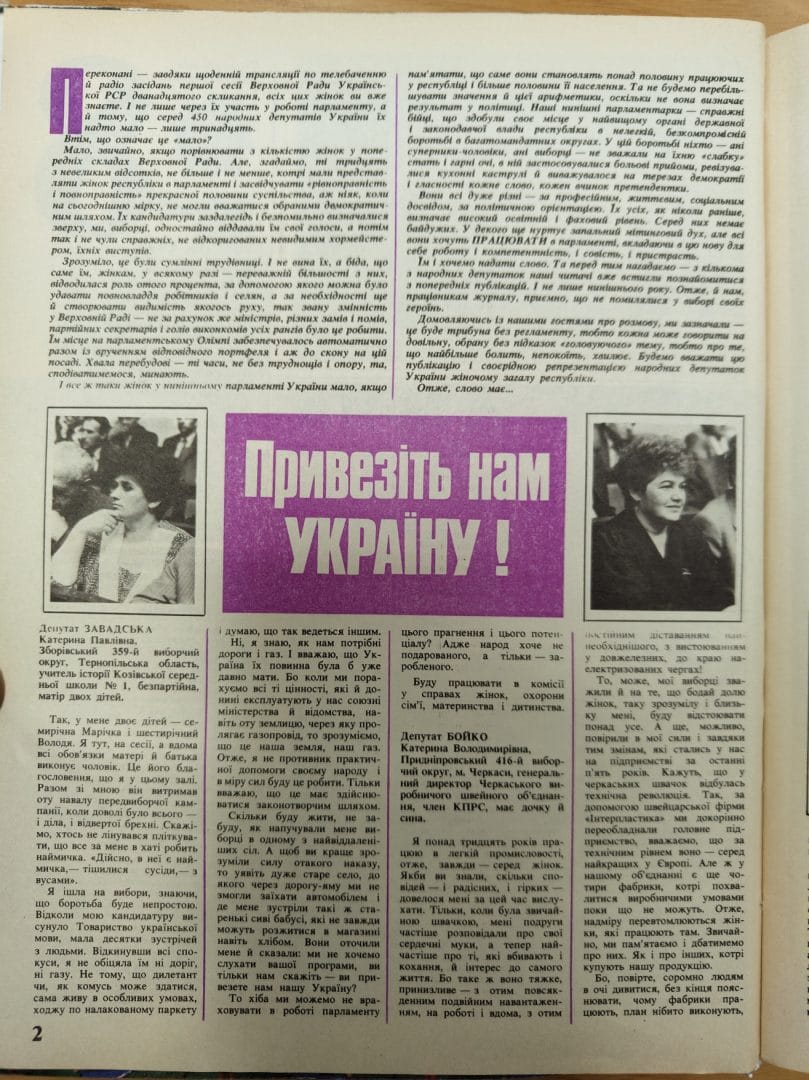
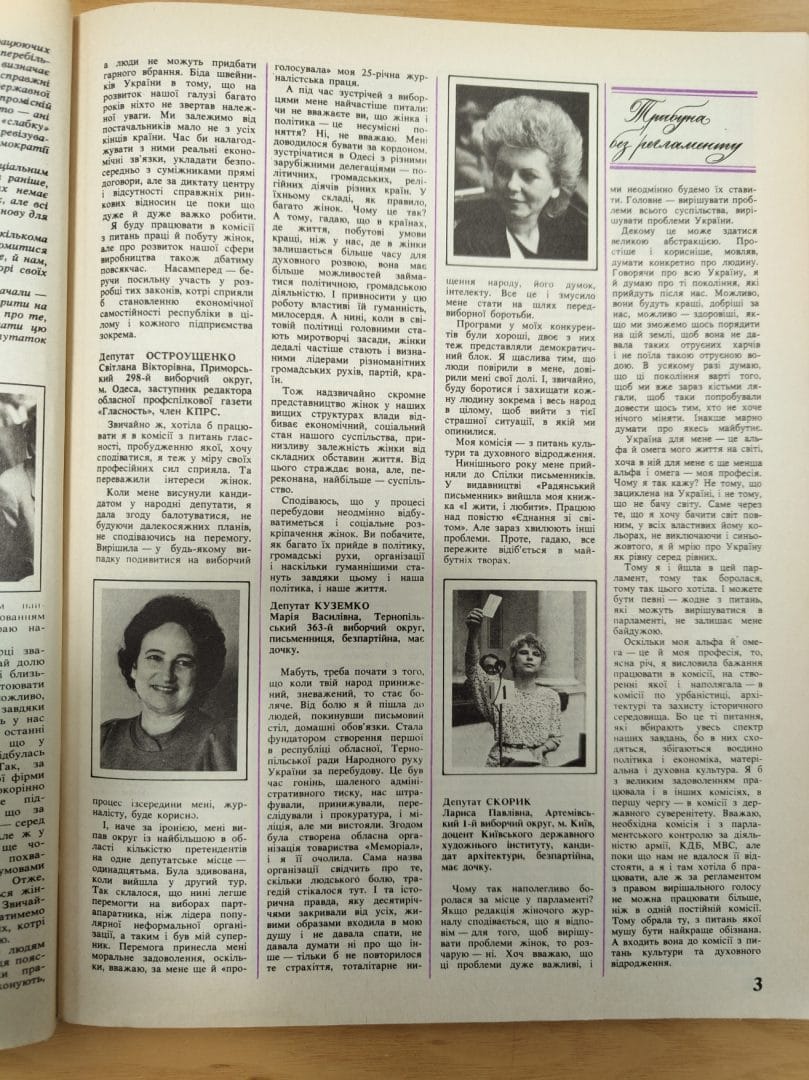
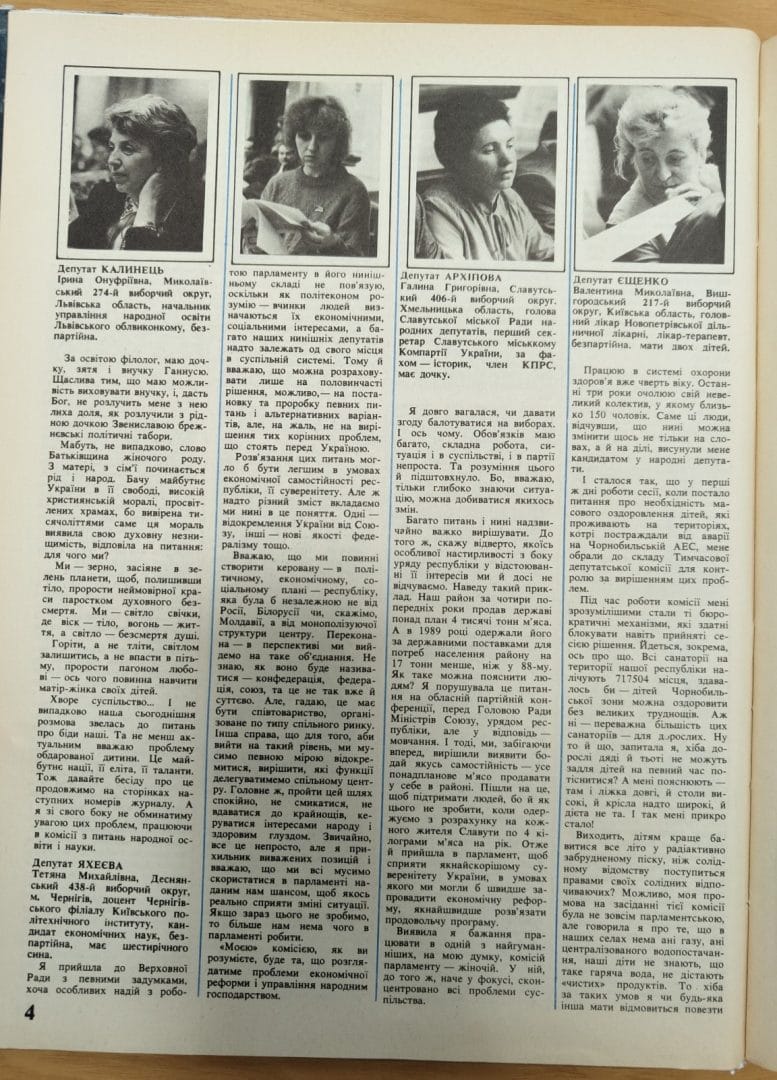
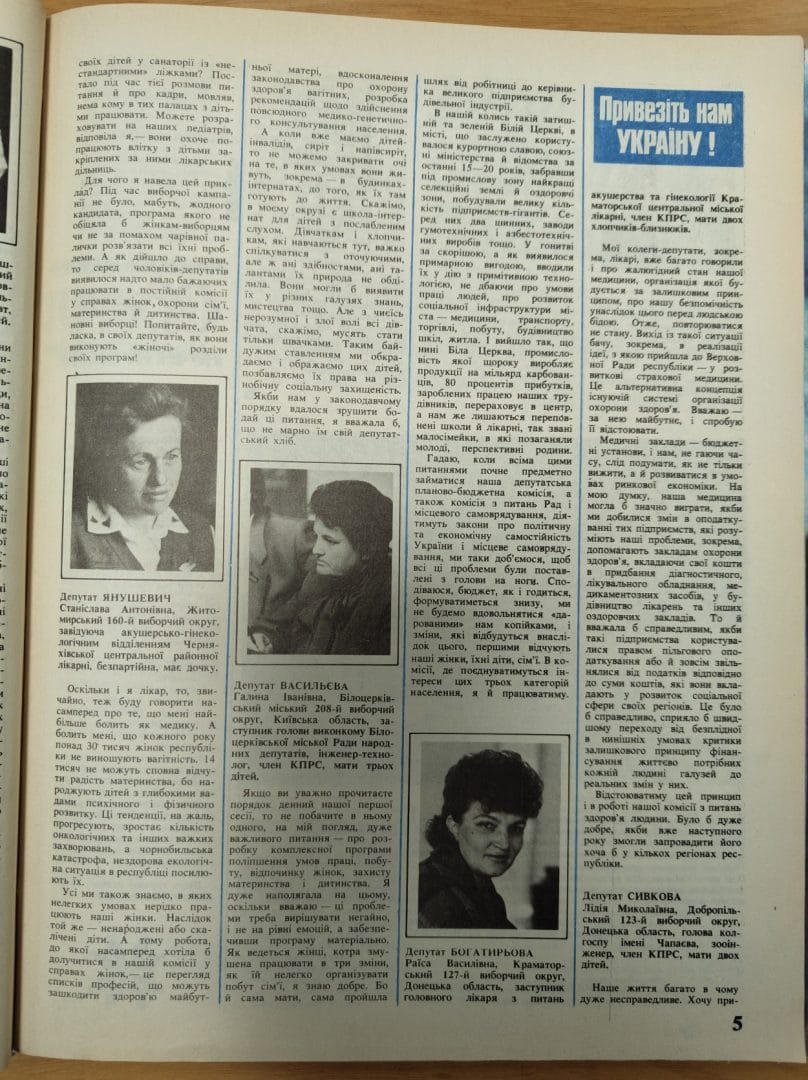
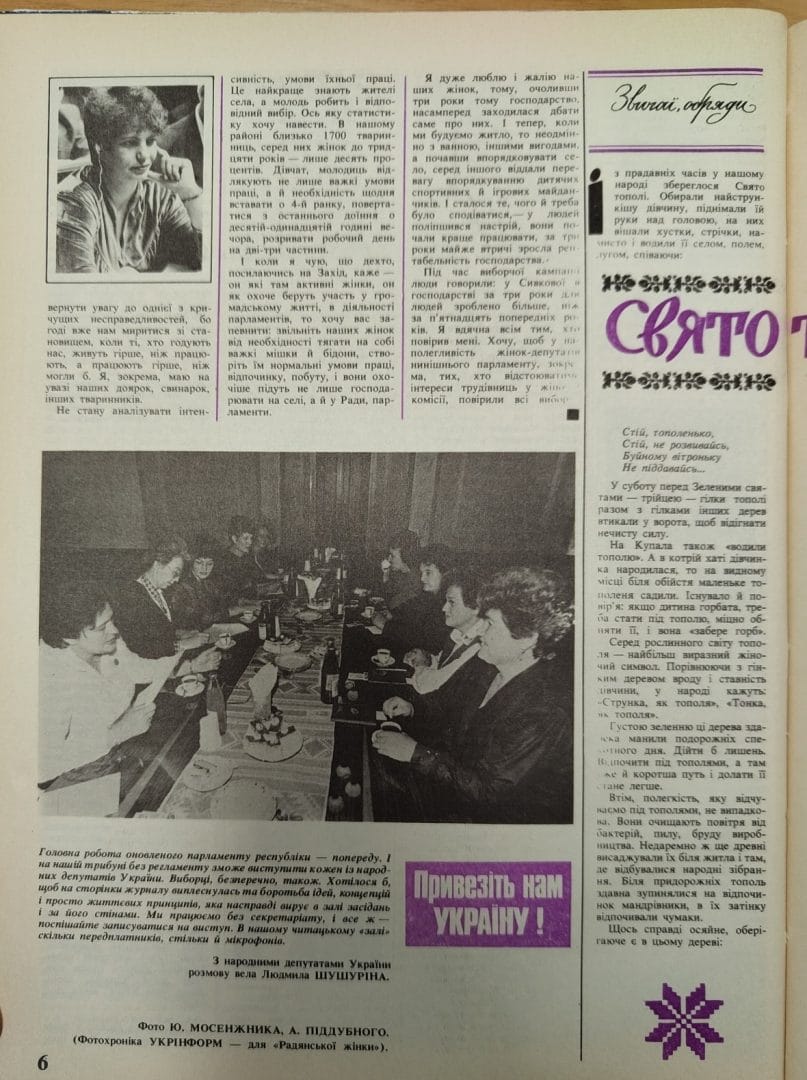

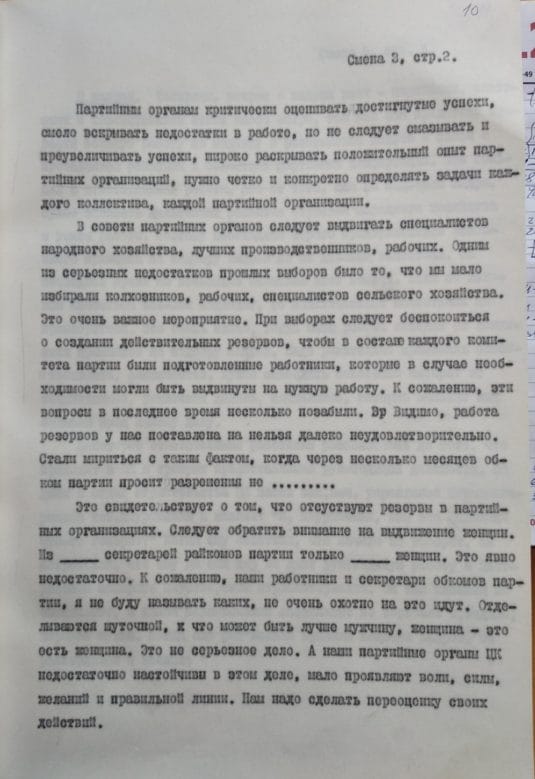
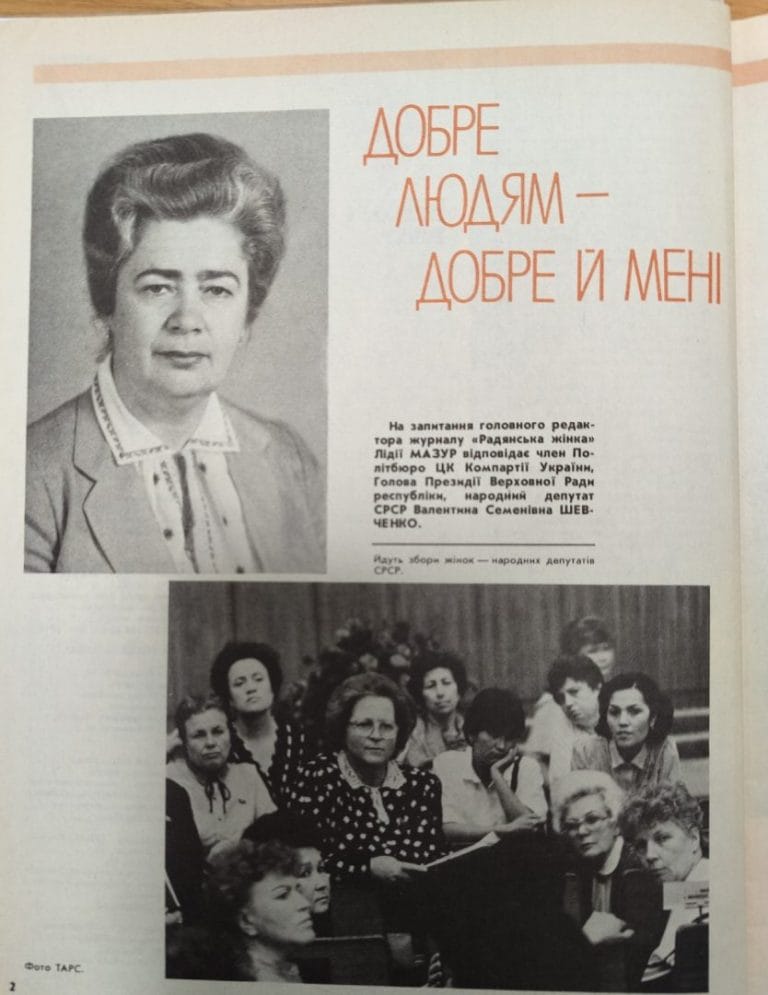
After the elections to the Supreme Soviet of the Ukrainian SSR of the 12th convocation in March 1990, female representation in parliament decreased from 234 (36%) deputies to 13 (2.7%). One of the reasons for this was the introduction of alternative voting, which brought real competition to the elections, and thus the practice of previous “women’s quotas” no longer worked. Correspondent Lyudmila Shushrina, in the preface to the article “Bring us our Ukraine!”, bitterly acknowledged the formal role of women in the previous convocations of the supreme councils, where their presence was meant to demonstrate “equality and full citizenship,” creating the appearance of the workers’ and peasants’ sovereignty, but they rarely got re-elected for a second term.
The genre of the proposed material is “a platform without regulations,” where each of the 13 deputies spoke about the most pressing issue, in her opinion, and defined her own parliamentary tasks. This approach allowed both the diversity of voices and the common vision of their challenges to emerge. They spoke about their motivation for participating in the elections, the difficulties associated with active public engagement, current state issues, and their views on how to address them.